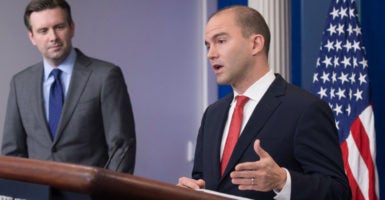After two years of investigation, many might be asking if the just released Benghazi report was worth it. The answer is yes.
The administration’s concocted narrative blaming the Benghazi attack on an amateurish anti-Muslim video is a major focus in the report.
With the publication of the 800-page report by the House Benghazi Select Committee on Tuesday, Americans now have an exhaustive account of the terrorist attack in Benghazi and its aftermath.
The administration’s concocted narrative blaming the Benghazi attack on an amateurish anti-Muslim video is a major focus in the report.
For the first time we know that U.N. Ambassador Susan Rice was briefed by Ben Rhodes, deputy national security adviser for strategic communications, and David Plouffe, President Barack Obama’s senior political adviser, which gave her statements the desired political spin:
Susan Rice’s comments on the Sunday talk shows were met with shock and disbelief by State Department employees in Washington. The Senior Libya Desk Officer, Bureau of Near Eastern Affairs, State Department, wrote: ‘I think Rice was off the reservation on this one.’ The Deputy Director, Office of Press and Public Diplomacy, Bureau of Near Eastern Affairs, State Department, responded: ‘Off the reservation on five networks!’ The Senior Advisor for Strategic Communications, Bureau of Near East Affairs, State Department, wrote: ‘WH [White House] very worried about the politics. This was all their doing.’ [pg. 132]
It appears Rhodes is very good at spinning false narratives.
The House Select Committee on Benghazi puts on display the Obama administration’s absolute ineptitude in the conduct of foreign policy and its political motivations that left U.S. diplomats in Libya tragically unprotected and the American public misinformed about what happened to our diplomats and why.
In a moment of national shock and horror, leaders in the White House and the State Department tried to shift the blame to a silly anti-Muslim video.
In a moment of national shock and horror, leaders in the White House and the State Department tried to shift the blame to a silly anti-Muslim video—and then, as we all remember too well, Obama took off for a political fundraiser in Las Vegas.
The basic Benghazi narrative, familiar from other investigations of the Benghazi attack, remains unaltered: The Obama administration wanted Libya to be a civilian nation-building success story, not another case of military intervention.
Consequently, the State Department sent one its most experienced diplomats to Tripoli, Ambassador Christopher Stevens, with the mandate of opening a consular facility in Benghazi. The State Department disregarded numerous instances of terrorist activity and attacks on diplomats in the city.
When the terrorists struck on Sept. 11, 2012, the administration was totally unprepared for a rescue and allowed political sensitivities to override the need for swift military action. In the aftermath, the administration shied away from blaming terrorism, which it had just declared to have defeated in the run up to the 2012 presidential election.
Nevertheless, there is plenty in the new report not previously known to the public. One instance is the account of a two-hour meeting—beginning at 7:30 p.m. on Sept. 11—at the White House after the attack began to attempt to flesh out a rescue attempt.
The failure of the administration to launch a rescue operation has been at the heart of much speculation surrounding Benghazi. Obama and Secretary of Defense Leon Panetta may have stated that they wanted a rescue operation, but no actual military orders were given.
Details of the high-level White House meeting show that no one had even thought of contingency plans, and it reads like an exercise in utter incompetence and confusion:
With Ambassador Stevens missing, the White House convened a roughly two-hour meeting at 7:30 PM, which resulted in action items focused on a YouTube video, and others containing the phrases ‘[i]f any deployment is made,’ and ‘Libya must agree to any deployment,’ and ‘[w]ill not deploy until order comes to go to either Tripoli or Benghazi.’ [p.115]
The Vice Chairman of the Joint Chiefs of Staff typically would have participated in the White House meeting, but did not attend because he went home to host a dinner party for foreign dignitaries.
A Fleet Antiterrorism Security Team (FAST) sat on a plane in Rota, Spain, for three hours, and changed in and out of their uniforms four times. [pg. 154]
Two Republican members of the committee added their own addendum with severe criticism of the State Department’s denial of adequate security for Stevens and his fellow diplomats. They have a point.
The Democrats released their own dissenting report—which tracks closely with that of the State Department’s Accountability Review Board, which attached blame only to lower-level State Department officials.
Mainly, though, the committee Democrats have attacked the Republican majority for failing to cooperate with them and for not sharing information, a charge rejected by Republicans in their rebuttal.
There is a massive amount of evidence in the Benghazi report of the absolute ineptitude and misplaced priorities of the Obama administration.
It remains tragic that it should so unnecessarily have cost four brave Americans their lives.































